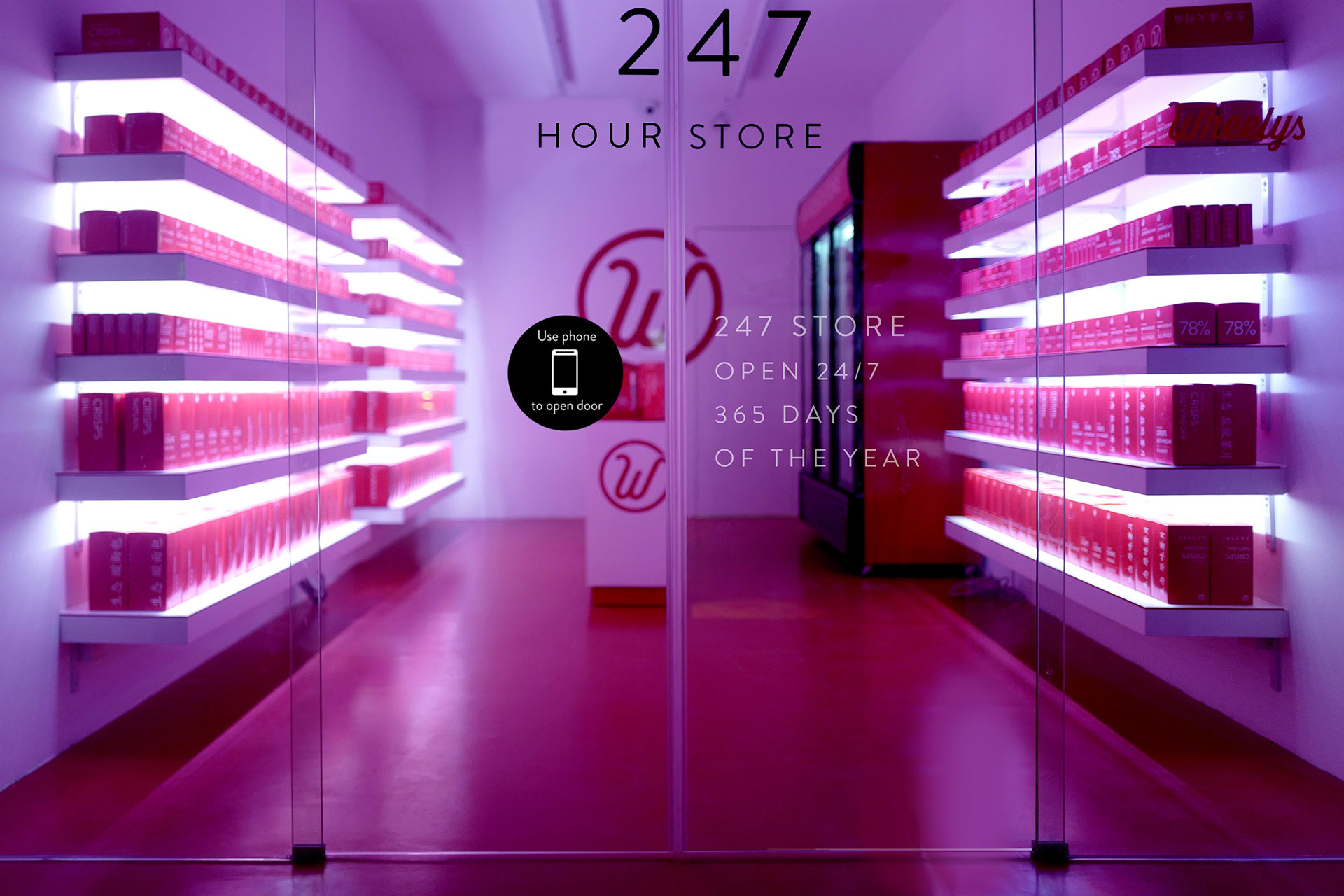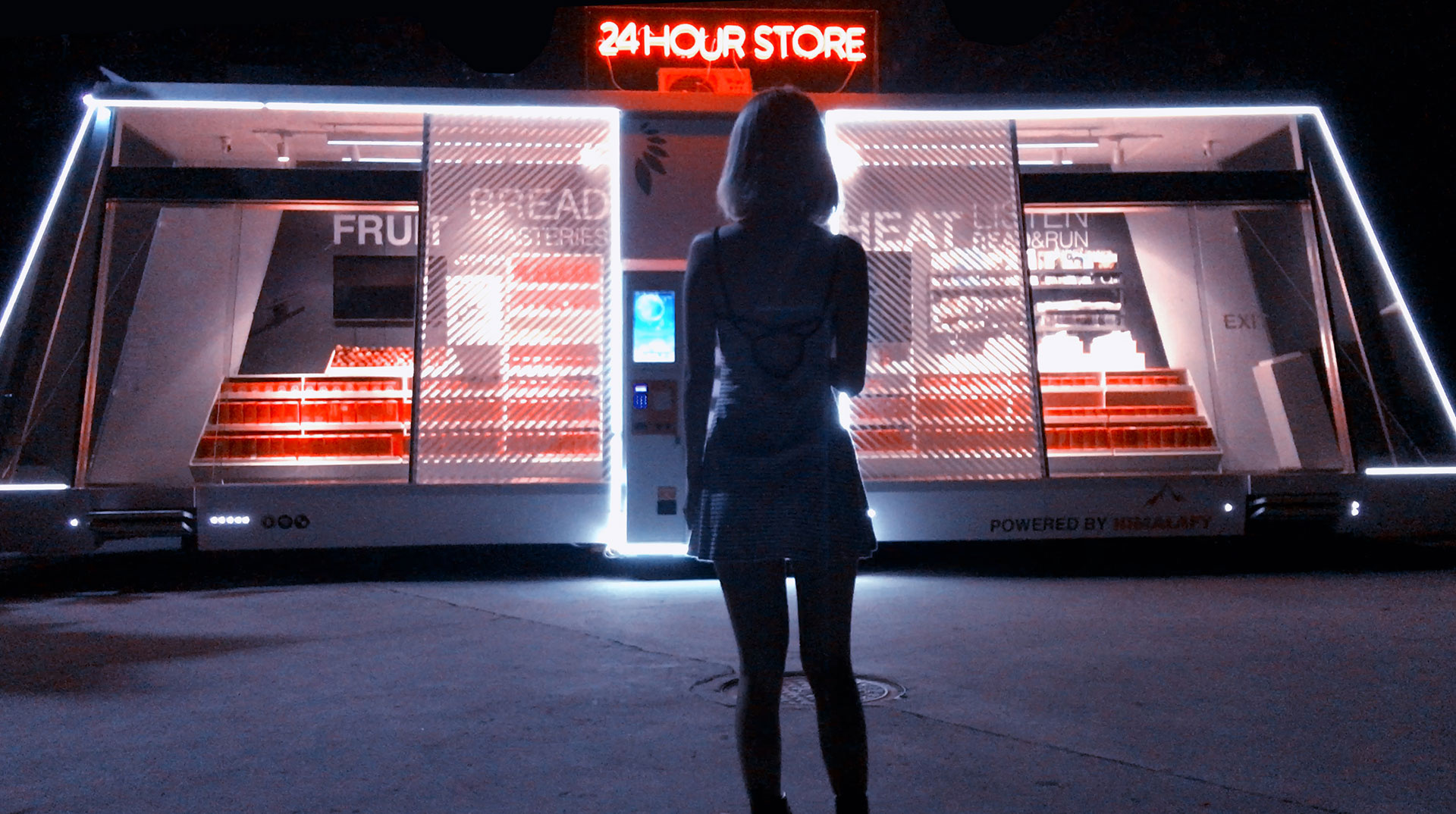A 24-hour convenience store opened in China

The Swedish company Wheelys has developed the Moby Store, an unmanned 24-hour convenience store on wheels, which is completely controlled by technology. The store is located on the campus of Hefei University of Technology, about 450 km west of Shanghai, where Wheelys works with researchers on the technological component of the project. More recently, the company planned to create a cafe that can be moved from one place to another on a bicycle, and now it is testing a model of an automatically controlled 24-hour supermarket.
Externally, the Moby Store is a vehicle parked on a square near the campus that looks like a bus of camouflage cyberpunk colors. Thanks to the glass floor-to-ceiling facade, visitors can see the shelves with red boxes at the entrance. To enter the store without a cashier and staff, you need to scan the QR-code using a smartphone, as the sign at the entrance warns.
Those who want to buy something in the Moby Store silently welcome a holographic face. Assortment groups of goods will not yield to ordinary supermarkets: you can find food, print publications and even shoes. All you need to do for a purchase is to scan a bar code using a smartphone application with registered bank card information, and then just exit the store. At this point, the system automatically debits the purchase amount from the customer’s account. All Moby Store systems are solar powered.

Unlike taxi and hotel business, which are rapidly changing both in China and around the world under the onslaught of Uber and Airbnb, retail trade has not yet undergone significant technological changes. However, some companies are working on it: so, Amazon is testing a similar concept of shopping at Amazon Go among its employees in Seattle. While a visitor shoves goods into bags and pockets, Amazon’s computer vision technology and video surveillance tools track actions and create a virtual shopping basket ... If a visitor changes his mind about buying a product, the system will automatically remove the item from the basket and double-check it before leaving.
The co-founders of Wheelys decided to test the new store not in Sweden, but in China for several reasons: high population density and almost universally developed mobile payment. According to the Better Than Cash Alliance, in 2016, out of 175 million transactions per day of the Chinese online payment operator Alipay, smartphones accounted for 60%.
Combined with the rising cost of rent and wages, supporting small stores is becoming increasingly difficult. Bo Wu, who oversees Wheelys projects in Shanghai, said that he received many requests from owners of large supermarkets who want to gain a competitive advantage thanks to technology.

Wheelys transferred the entire research and development department, as well as the design department from Sweden to China, and also created a new branch of the company engaged in the development of an automated store system. Per Cromwell, one of the co-founders of Wheelys, notes that the next step is to improve the technology that drives the high-tech store on wheels. The company does not specify how much the company's capabilities have changed after the transfer of technological capacities to China.
Wei Li, a junior computer science specialist at Hefei University of Technology, who tested the store but did not participate in the study itself, wonders how the store can handle multiple purchases at the same time, and how to avoid shoplifting.
Together with Hefei University of Technology, Wheelys plans to develop a system that collects the customer’s biometric data — first of all, the gait features — when he scans the QR code and uses the sensors on the shelves to select and remove items from the basket. Buyers will have to register an account in advance, and if one of the items in the cart is deleted, the system will contact the buyer's ID to prevent theft.
After the buyer completes the payment, the biometric information that the sensors collect at the door will be automatically deleted. Such a security system will be installed in the store in the summer of 2017. Then anyone can install the application Wheelys 247 on their smartphone and go shopping in the Moby Store.
In the future, Wheelys hopes to integrate even more technological solutions. For example, a hologram that welcomes customers at the entrance can become a full-fledged consultant with artificial intelligence: to help in choosing products, not to go beyond a certain budget and offer individual actions and solutions. The company also has a plan to create a cloud system that will store information about customer behavior in general, as well as the preferences of individual customers.
This will help shop owners to better analyze information and decide which products are best to sell in specific places. It is possible that Wheelys will even be able to develop the technological component of Moby Store to such an extent that this supermarket on wheels can be replenished autonomously, returning to warehouses when stocks of goods run out. Vehicle autonomy will also increase sales if the store moves to different locations in accordance with demand forecasts.
In small towns and villages in Sweden, such autonomous stores will solve another problem: according to Cromwell, there are practically no stores left in small towns: people move to big cities, the population of small villages is decreasing. To go shopping, the remaining have to travel long distances.
Co-founders of Wheelys also do not exclude the option of launching a franchise on the Moby Store or specialty stores. In this way, you can reduce costs and make profits from sales, even in remote areas.
All Articles